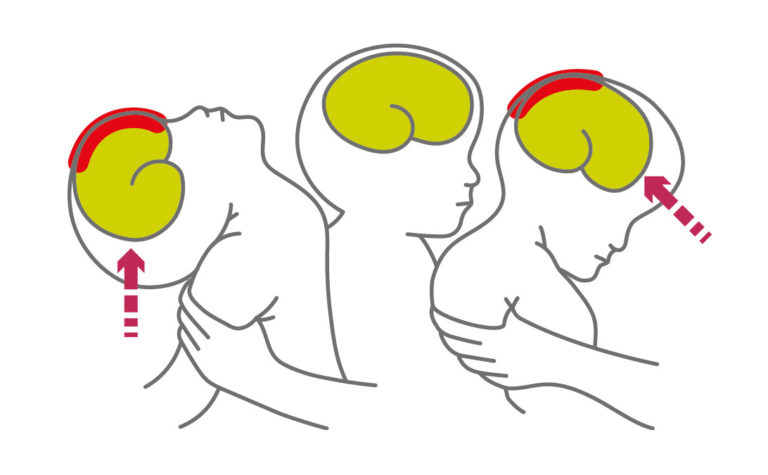Contact us
High contrast
This page has been translated automatically.
You will soon be able to take your child* home with you. Questions often arise at home, especially if this is your first child. This brochure is designed to provide you with useful information and helpful tips.
We recommend a first visit to the paediatrician about a week after leaving hospital. The UKBB will provide you with a health booklet in which all preliminary examinations and immunisations are recorded. Please take it with you to every paediatric appointment, parent consultation or hospital stay.
If you have any questions or uncertainties, you can contact the parent counselling service or your paediatrician. The Medgate Kids Line is available at night and at weekends.
The causes of sudden infant death (SID) have been studied intensively for years. It has been proven that the risk of infant death can be greatly reduced with simple measures in the child's sleeping environment.
The following points are important:
Due to the prevention of sudden infant death syndrome, children always lie on their back during sleep. It is therefore all the more important for the child's motor development that he or she awake is also placed on the stomach (twice a day for 5-10 minutes).
In this way, the child learns to lift its head, support itself and turn. These movements are the basis for learning to crawl and are important for later locomotion.
If possible, children are fully breastfed or, depending on the child's needs, are given a bottle (bottle) with expressed breast milk or bottle feeds with powdered milk. Whether the child is adequately nourished is determined as follows:
Breastfeeding
Breast milk provides sufficient nutrition for babies. It is therefore not necessary to give additional tea during breastfeeding. Please note the following:
Bottle feeding with expressed breast milk
Expressed breast milk can be stored and prepared as follows:
Preparation: For a comfortable drinking temperature, warm the breast milk in a water bath. A drop can be dripped onto the surface of your hand to check the temperature. If it feels pleasantly warm, the temperature is perfect.
Bottle feeding with formula milk (powdered milk)
Breast milk never heat or defrost in the microwave. (This destroys the ingredients and poses a risk of burns for the child). Once defrosted, breast milk can be kept for 24 hours in the top compartment of the fridge (at the very back).
Breast milk never Place/store in the refrigerator door (do not interrupt the cold chain) and the same milk only once warm up.
During breastfeeding, the mother's diet has an influence on the consistency of breast milk. It is therefore beneficial for your child if you eat a balanced diet and drink a glass of water with at least every meal and every breastfeeding session. You can find detailed information on this topic in the brochure "Nutrition during pregnancy and breastfeeding" on the Swiss Breastfeeding Promotion website www.stillfoerderung.ch.
You can prevent certain infections in your child if you:
Newborn babies do not yet have a stable day-night rhythm. This is how the rhythm can be encouraged:
Children can suffer from colic and flatulence. This requires a lot of patience from parents. The following measures have a supportive effect:
Eyes
Bathing
Skin care
Navel
Nails
Nose
Body temperature
Hot water bottles, electric blankets, radiant heaters or heat lamps must not be used, as children cannot equalise the heat supplied.
Holding and moving the child in a targeted manner supports their motor development. Play position Sitting comfortably with your legs up and your child on your lap is ideal for making contact, playing and exploring in a safe and secure environment during the waking hours. Give your child various toys that they can grasp with their hands and feel with their feet.
* Parents of premature babies should refer to the following instructions.
When babies cry a lot and for a long time, parents are often desperate. Here's how you can help your baby to calm down:
Every baby is different and needs individual support to calm down. However, it is important that you are patient and remain calm.
If you are under a lot of stress and need support, contact the Mothers' and Fathers' Counselling Service www.muetterberatung-bl-bs.ch or via the website www.familystart.ch

Even if you lose your temper for just a few seconds, this can have serious consequences for your baby, such as permanent physical or mental disabilities and can even lead to death.
Premature babies sometimes have different day-to-day handling needs than full-term babies. Our video list on various topics and techniques shows how you, as parents of a premature baby, can promote physiological movement and development.
058 387 78 82 (Costs are settled via the health insurance company)
In the event of an emergency abroad, call the emergency number of your health insurance company. You will find the contact details on your health insurance card.
145 (Poison and Information Centre)
University Children's Hospital of both
Basel, Spitalstrasse 33
4056 Basel | CH
Phone +41 61 704 12 12
© UKBB, 2025
The Medgate Kids Line provides quick and uncomplicated medical advice if your child is unwell. The medical team of our partner Medgate is available to you by telephone around the clock.
For emergencies abroad: Call the emergency number of your health insurance company. You will find this number on your health insurance card.
More information: On the Page of the emergency ward you will find everything you need to know about behaviour in emergencies, typical childhood illnesses and waiting times.
144 Outpatient clinic
145 Tox Info Suisse (Poisonings)
117 Police
118 Fire brigade
Which topic would you like to contact us about?
For praise or criticism, please use the Feedback form.